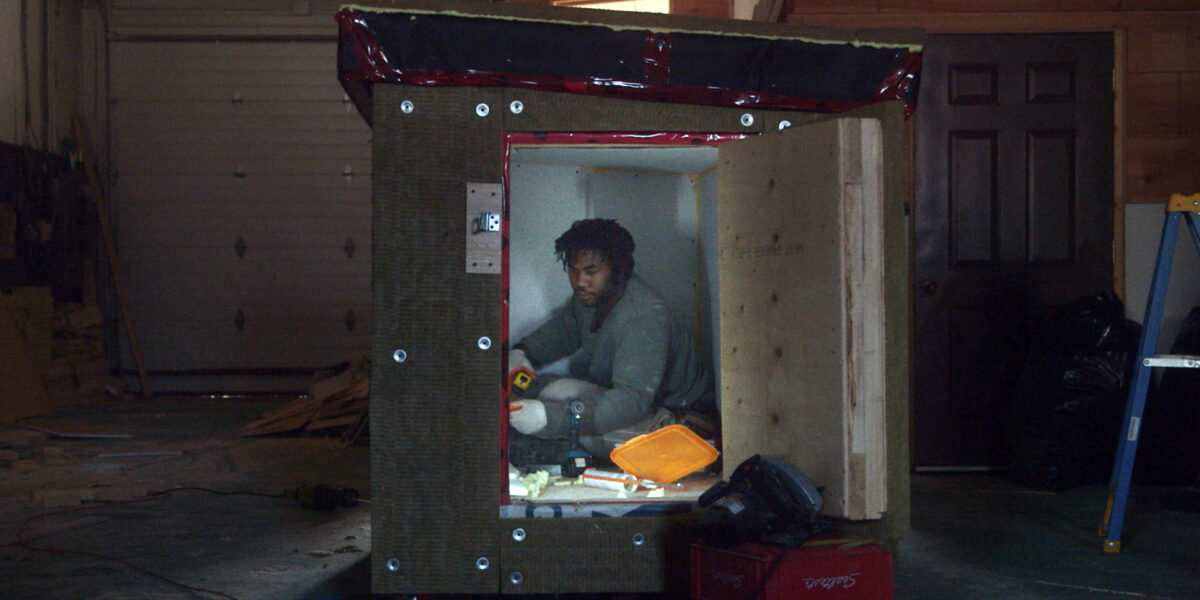Winters in Toronto, much like in the rest of Canada, are brutally unforgiving.
With temperatures often dipping below -10 and -15 degrees Celsius, spending a long period of time in the harsh outdoor conditions can lead to frostbite, hypothermia — and, all too often, death.
That’s why carpenter Khaleel Seivwright stepped up in the summer of 2020 during the early months of the COVID-19 pandemic, as the world was warned to “stay the blazes home,” to help keep as many people off the streets as possible ahead of the winter season.
Seivwright is the subject of Someone Lives Here, a new documentary showcasing his work creating tiny shelters across Toronto.
Someone Lives Here premiered at the 2023 Hot Docs Canadian International Documentary Festival, where it received the Rogers Audience Award.
In an interview with rabble.ca, Seivwright looked back on his critical work during the pandemic and the overwhelming support the documentary has received.
Legality and liability
Building the shelters in the dead of night, Seivwright says in the documentary his greatest concern is being stopped by police — being criminalized for trying to save the lives of others.
That’s why he was surprised to hear from the city about a possible “partnership” of sorts.
“I’m really, really impressed with what you have done,” a program manager from the City of Toronto told Seivwright, adding “it’s really cool.”
But things didn’t stay cool for Seivwright for long. One week later, the city council issued a public letter demanding he “immediately cease the production, distribution, supply and installation of such shelters on city property.”
Recalling the tumultuous “partnership” with the city, Seivwright described the threat of criminalizing his work with tiny shelters in one word: stressful.
He said it was interesting to learn about the ways the city council operates, particularly around concerns of legality and liability.
“It felt like what was limiting them from really helping people in a very real way were abstract ideas about who is responsible, who gets the blame when something happens,” Seivwright said.
He eventually came to the conclusion that if you’re not working with the government hand-in-hand, “you will most likely be crushed by them if they don’t agree with you.”
Client calls shelter dysfunction ‘stupidifying’
The film begins with the voice of 58-year-old Taka, who asks the director to not record her face during the interview.
“Maybe because I have nothing left,” Taka explained to filmmaker Zack Russell. “The last would be my image and I want to keep it.”
Taka describes shelters as a “sewer” of ego power trips by temporary staff.
“It’s against dignity, it’s dehumanizing, and it’s stupidifying,” Taka said. “You will never have a full sleep, you will be awoken three to five times a night… it’s worse than jail.”
A carpenter by trade, Seivwright knows first-hand the struggle of being unhoused.
He spent five months living in a tent during a chilly Vancouver winter, noting he was surprised by the unanticipated challenges he needed to overcome just to survive.
Watching the documentary, it becomes clear just how labour-intensive Seivwright’s work is. From painting, installing insulation, drilling, nailing, sanding, screwing, sawing, putting in windows and a carbon monoxide detector, it’s no wonder the tiny shelters became a full-time job for Seivwright.
No meaningful plan to address homelessness
The film ends on what Seivwright calls “an eerie note,” as the camera pans across Toronto parks where his tiny shelters used to stand.
“It’s as if nothing had ever happened,” he said. “It’s the invisibilizing of homelessness.”
Seivwright hopes if audiences take anything away from the film, it’s about the disorganization between departments at the City of Toronto that makes it impossible for officials to coordinate a meaningful plan to combat homelessness.
“You have these decisions being made haphazardly, that are costing lots and lots of money, that aren’t fundamentally solving any problem.”
Tiny shelters an alternative to restrictive shelter system
Seivwright believes more people would be sympathetic to the plights of people experiencing homelessness if they understood just how restrictive the shelter system can be.
He pointed out that most shelters have a two-bag limit, forcing clients to pick and choose from what limited belongings they may have just to access the space.
Some shelters force clients to leave during the day and return by a curfew or risk losing their bed.
“It just doesn’t make sense for the reality of many folks,” he said.
Rather than confine unhoused people to a series of punishing rules and regulations, Seivwright says his shelters offered a sense of consistency that clients wouldn’t find elsewhere.
“You’re going to leave and come back and your life isn’t going to be completely turned upside down,” he explained. “Your medication is still going to be there. Your IDs are still going to be where you put them.”
The tiny shelters don’t just offer a sense of safety and security. The fact that they are also physically off the ground, don’t leak and have proper insulation gives a peace of mind that tents simply don’t have.
Nowadays, Seivwright is taking his shelters to the next level — creating a cabin community made up of tiny shelters.
Over the last 18 months, he’s worked alongside architects, planners, engineers and Toronto Community Housing to bring his vision to fruition.
The project’s timeline is still unclear, but Seivwright says he is confident the cabin community will make a real difference for unhoused folks who want more autonomy than a shelter in the system can provide.



